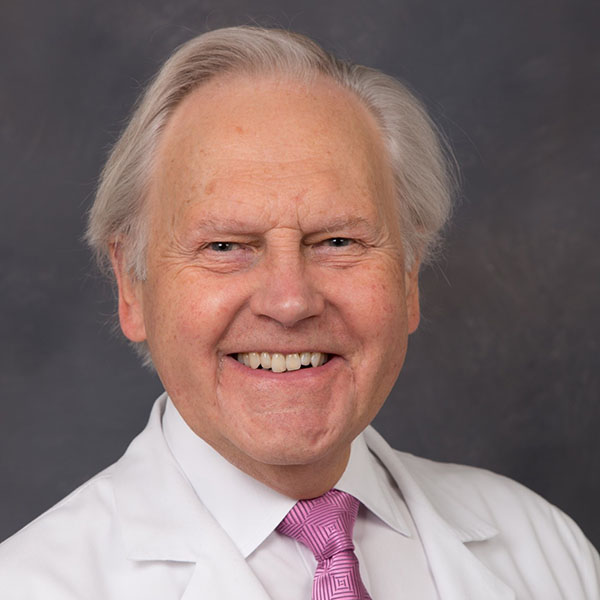Brian Leyland-Jones: Now Is the Time!
“This is the transformative time in oncology,” heralds Brian Leyland-Jones, M.B., B.S., Ph.D., and there is no spin doctoring in the statement by the member of the National Foundation for Cancer Research’s scientific advisory board. From genomics to targeted therapies to vaccinations, the last 40 years has seen more strides in oncology than nearly all the years before them. And Dr. Leyland-Jones has contributed greatly to paving the road.
He helped develop drugs that are now mainstays of oncological breast cancer treatment (such as the anthracycline, antimetabolite and platin families), as well as the targeted therapies trastuzumab (sold as Herceptin) and bevacizumab (Avastin). He also helped disprove some theories about how to best treat breast cancer patients. For example, he demonstrated that two years of adjuvant trastuzumab was no better than the standard one year of treatment for women with HER2-positive, early-stage breast cancer. Not bad for a guy who started medicine in a completely unrelated field.
“I started doing cardiothoracic surgery,” he recalls. “I had a very close girlfriend at the time who was an oncologist. And one evening she asked, ‘Brian, why do you keep on pursuing cardiothoracic research? Oncology is where the change is.’ And after that point, I thought about it and moved into the field. And her words were absolutely true.”
For the record, Dr. Leyland-Jones did not become a world-respected oncologist just to impress a girl; he firmly states that his whole drive was to make the maximum impact in a field. And that he did, becoming Vice-President of Molecular and Experimental Medicine at the Avera Cancer Institute and Director of Precision Oncology in Sioux Falls, South Dakota, and Cancer Center Director at McGill University and the Winship Cancer Institute before that. He and his team’s work with combination targeted therapies and immunotherapies aim to close down the oncogenic drivers of cancer, the cues stemming from mutated genes that ultimately result in tumor formation.
He is also pushing the idea of N-to-1 trials, a clinical trial that is of just one person. Even the best cancer therapies tend to paint in broad strokes and disregards the fact the same type of cancer can still vary widely in its response to drugs. Testing patients on an individual basis is not necessarily a new idea — doctors have long prescribed one drug after another for a patient in an effort to monitor efficacy — but such an approach has yet to be standardized. But as oncology, and curative measures in general, moves closer to targeted therapy aimed at individuals and individual subsets within a population, “precision medicine” may become the rule.
Dr. Leyland-Jones sees more inevitabilities, such as sequencing the genome of a patient will become routine at diagnosis and that within the decade, CRISPR, a technology that engineers a patient’s existing T cells (the assassins of the immune system) to find and kill cancer cells will be an oncological go-to. Beyond those, he predicts:
“I think that the whole immunology field, that is, the immunological approach, to cancer will explode in terms of neoantigen profiling, in terms of vaccines, in terms of a plethora of immunotherapies which have been developed. And I would say we will have a successful early-detection cancer test within the next 10 years.”
Another revolution in cancer research is one away from the lab, and one where the National Foundation for Cancer Research (NFCR) provides crucial support: networking. Even in this interconnected age, several labs and scientists can remain ignorant of the other’s work. While NFCR is most known for its cancer research funding, Dr. Leyland-Jones cites the high-profile Szent-Györgyi Prize as leading to many collaborations that otherwise would have remained laborious at best to start, if they could be started at all. Thanks to NFCR, Dr. Leyland-Jones is now in constant contact with cancer luminaries from Texas to China.
“It’s just been an enormous pleasure working with a team,” he says. “I think NFCR basically works by synergy. Everyone works together and synergizes together.”
References:
NFCR thanks Dr. Leyland-Jones for his Spring 2019 interview
Schork, Nicholas J. (2015). Time for one-person trials. Retrieved from: https://www.nature.com/news/personalized-medicine-time-for-one-person-trials-1.17411
Wanjek, Christopher. (2018). How Close Are We, Really, to Curing Cancer with CRISPR? Retrieved from: https://www.livescience.com/63192-curing-cancer-crispr.html













